Auditing and Assurance: Evaluating Financial Reports of Woolworths Limited
VerifiedAdded on 2023/06/16
|10
|3615
|215
AI Summary
This report evaluates the financial reports of Woolworths Limited by Deloitte Touche Tohmatsu, applying auditing standards such as ASA 315, ASA 570 and ASA 701. It also discusses the risks associated with substantial mismanagement, impact on audit of important transactions and events affecting the company's capability to remain successful.
Contribute Materials
Your contribution can guide someone’s learning journey. Share your
documents today.
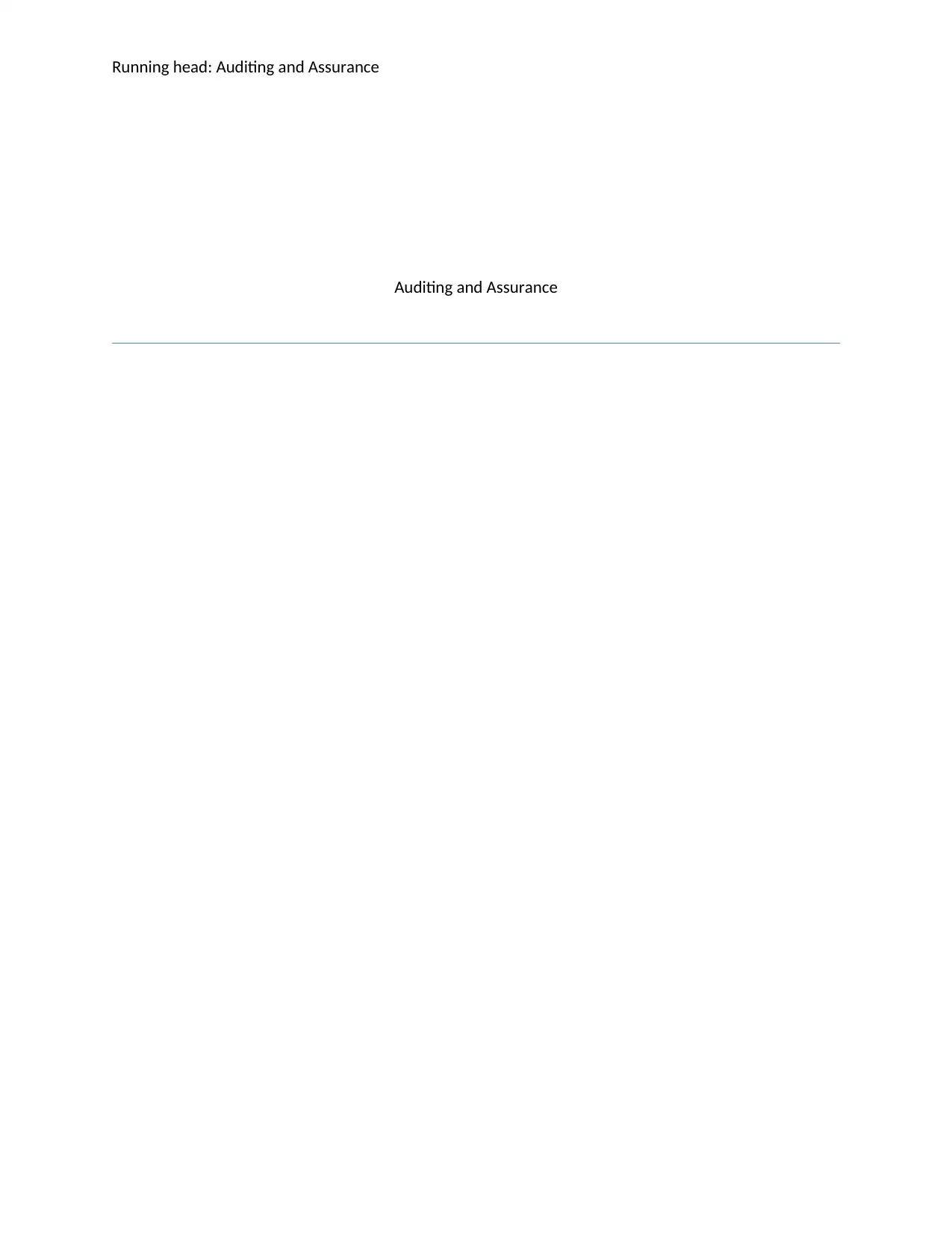
Running head: Auditing and Assurance
Auditing and Assurance
Auditing and Assurance
Secure Best Marks with AI Grader
Need help grading? Try our AI Grader for instant feedback on your assignments.
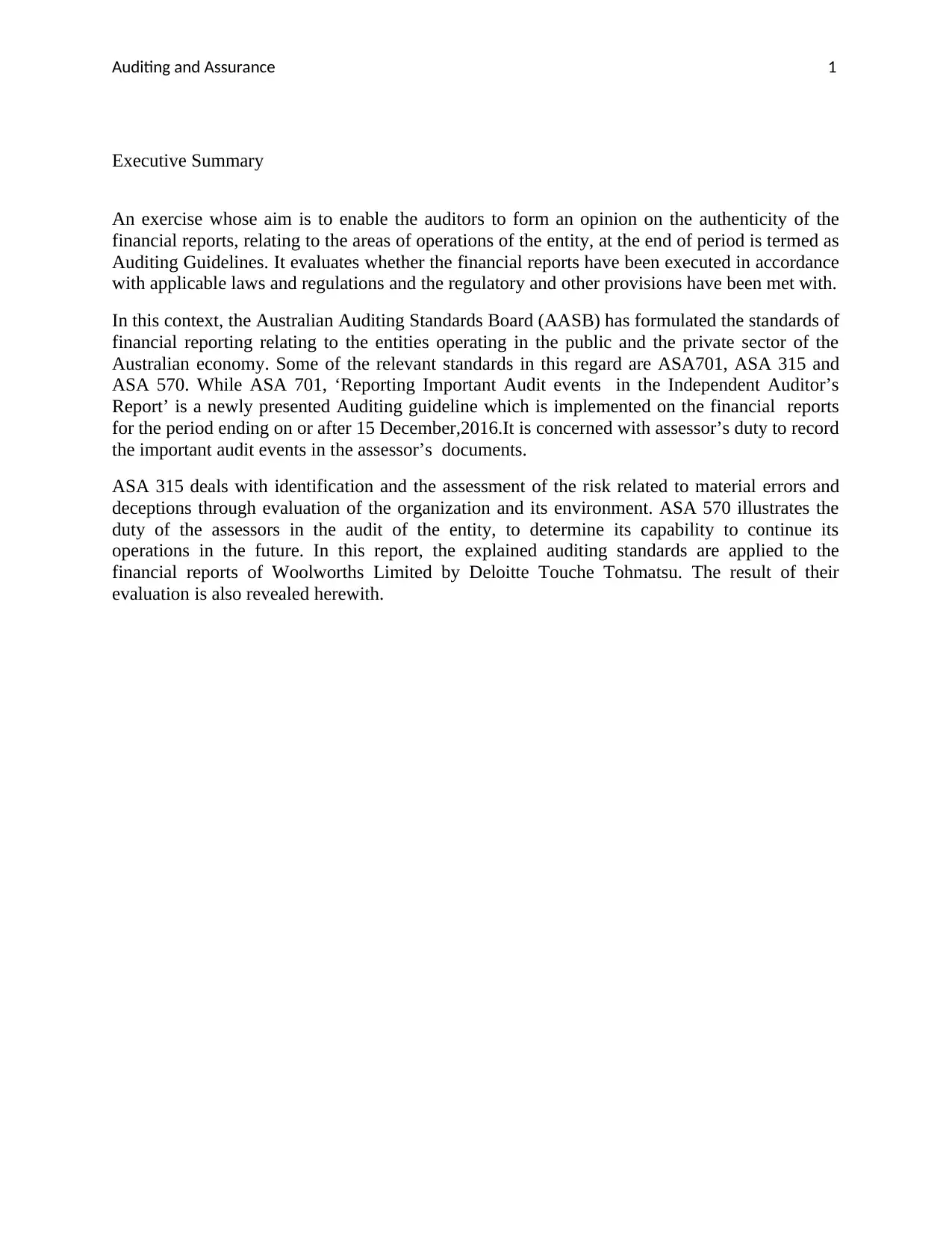
Auditing and Assurance 1
Executive Summary
An exercise whose aim is to enable the auditors to form an opinion on the authenticity of the
financial reports, relating to the areas of operations of the entity, at the end of period is termed as
Auditing Guidelines. It evaluates whether the financial reports have been executed in accordance
with applicable laws and regulations and the regulatory and other provisions have been met with.
In this context, the Australian Auditing Standards Board (AASB) has formulated the standards of
financial reporting relating to the entities operating in the public and the private sector of the
Australian economy. Some of the relevant standards in this regard are ASA701, ASA 315 and
ASA 570. While ASA 701, ‘Reporting Important Audit events in the Independent Auditor’s
Report’ is a newly presented Auditing guideline which is implemented on the financial reports
for the period ending on or after 15 December,2016.It is concerned with assessor’s duty to record
the important audit events in the assessor’s documents.
ASA 315 deals with identification and the assessment of the risk related to material errors and
deceptions through evaluation of the organization and its environment. ASA 570 illustrates the
duty of the assessors in the audit of the entity, to determine its capability to continue its
operations in the future. In this report, the explained auditing standards are applied to the
financial reports of Woolworths Limited by Deloitte Touche Tohmatsu. The result of their
evaluation is also revealed herewith.
Executive Summary
An exercise whose aim is to enable the auditors to form an opinion on the authenticity of the
financial reports, relating to the areas of operations of the entity, at the end of period is termed as
Auditing Guidelines. It evaluates whether the financial reports have been executed in accordance
with applicable laws and regulations and the regulatory and other provisions have been met with.
In this context, the Australian Auditing Standards Board (AASB) has formulated the standards of
financial reporting relating to the entities operating in the public and the private sector of the
Australian economy. Some of the relevant standards in this regard are ASA701, ASA 315 and
ASA 570. While ASA 701, ‘Reporting Important Audit events in the Independent Auditor’s
Report’ is a newly presented Auditing guideline which is implemented on the financial reports
for the period ending on or after 15 December,2016.It is concerned with assessor’s duty to record
the important audit events in the assessor’s documents.
ASA 315 deals with identification and the assessment of the risk related to material errors and
deceptions through evaluation of the organization and its environment. ASA 570 illustrates the
duty of the assessors in the audit of the entity, to determine its capability to continue its
operations in the future. In this report, the explained auditing standards are applied to the
financial reports of Woolworths Limited by Deloitte Touche Tohmatsu. The result of their
evaluation is also revealed herewith.
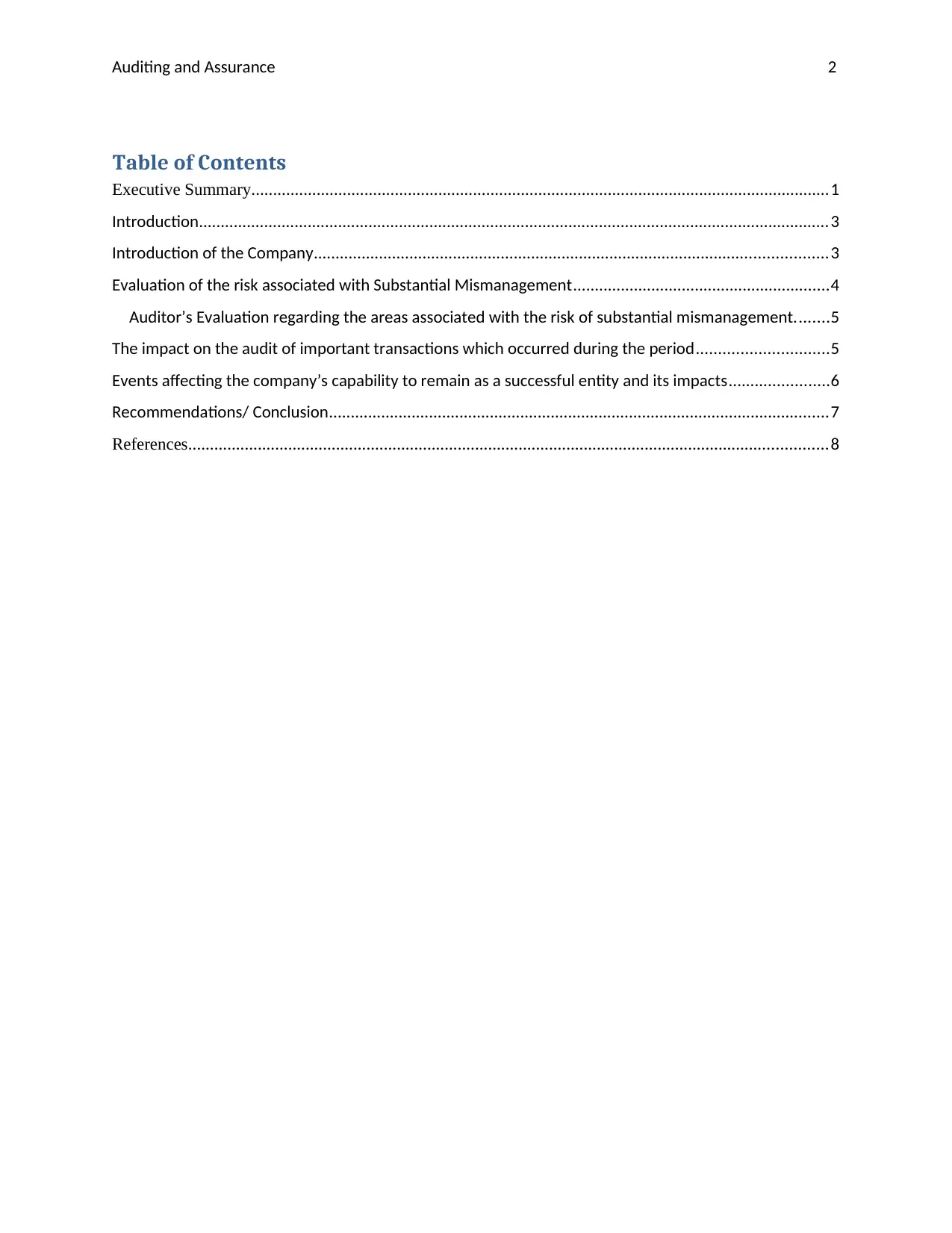
Auditing and Assurance 2
Table of Contents
Executive Summary.....................................................................................................................................1
Introduction.................................................................................................................................................3
Introduction of the Company......................................................................................................................3
Evaluation of the risk associated with Substantial Mismanagement...........................................................4
Auditor’s Evaluation regarding the areas associated with the risk of substantial mismanagement........5
The impact on the audit of important transactions which occurred during the period..............................5
Events affecting the company’s capability to remain as a successful entity and its impacts.......................6
Recommendations/ Conclusion...................................................................................................................7
References...................................................................................................................................................8
Table of Contents
Executive Summary.....................................................................................................................................1
Introduction.................................................................................................................................................3
Introduction of the Company......................................................................................................................3
Evaluation of the risk associated with Substantial Mismanagement...........................................................4
Auditor’s Evaluation regarding the areas associated with the risk of substantial mismanagement........5
The impact on the audit of important transactions which occurred during the period..............................5
Events affecting the company’s capability to remain as a successful entity and its impacts.......................6
Recommendations/ Conclusion...................................................................................................................7
References...................................................................................................................................................8
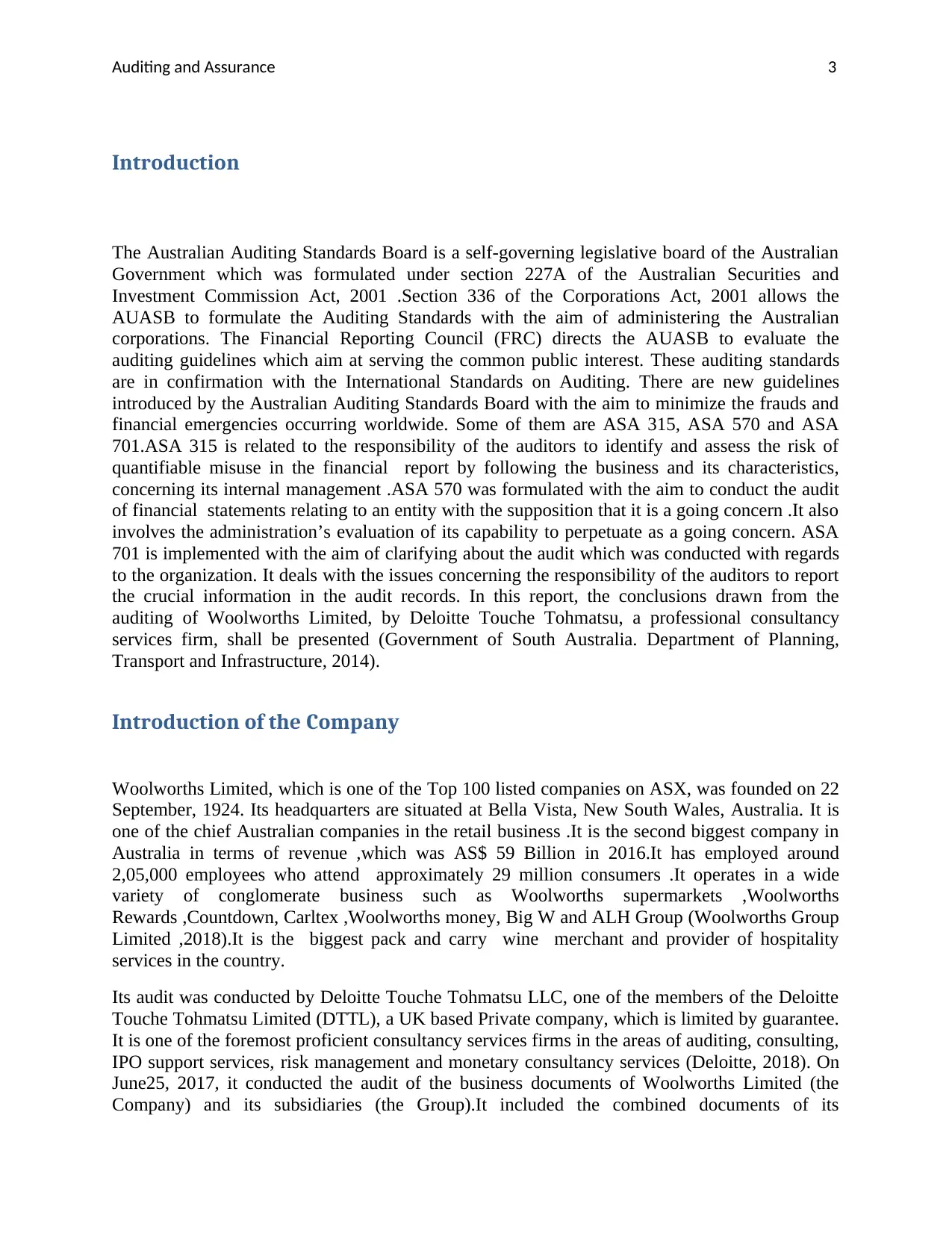
Auditing and Assurance 3
Introduction
The Australian Auditing Standards Board is a self-governing legislative board of the Australian
Government which was formulated under section 227A of the Australian Securities and
Investment Commission Act, 2001 .Section 336 of the Corporations Act, 2001 allows the
AUASB to formulate the Auditing Standards with the aim of administering the Australian
corporations. The Financial Reporting Council (FRC) directs the AUASB to evaluate the
auditing guidelines which aim at serving the common public interest. These auditing standards
are in confirmation with the International Standards on Auditing. There are new guidelines
introduced by the Australian Auditing Standards Board with the aim to minimize the frauds and
financial emergencies occurring worldwide. Some of them are ASA 315, ASA 570 and ASA
701.ASA 315 is related to the responsibility of the auditors to identify and assess the risk of
quantifiable misuse in the financial report by following the business and its characteristics,
concerning its internal management .ASA 570 was formulated with the aim to conduct the audit
of financial statements relating to an entity with the supposition that it is a going concern .It also
involves the administration’s evaluation of its capability to perpetuate as a going concern. ASA
701 is implemented with the aim of clarifying about the audit which was conducted with regards
to the organization. It deals with the issues concerning the responsibility of the auditors to report
the crucial information in the audit records. In this report, the conclusions drawn from the
auditing of Woolworths Limited, by Deloitte Touche Tohmatsu, a professional consultancy
services firm, shall be presented (Government of South Australia. Department of Planning,
Transport and Infrastructure, 2014).
Introduction of the Company
Woolworths Limited, which is one of the Top 100 listed companies on ASX, was founded on 22
September, 1924. Its headquarters are situated at Bella Vista, New South Wales, Australia. It is
one of the chief Australian companies in the retail business .It is the second biggest company in
Australia in terms of revenue ,which was AS$ 59 Billion in 2016.It has employed around
2,05,000 employees who attend approximately 29 million consumers .It operates in a wide
variety of conglomerate business such as Woolworths supermarkets ,Woolworths
Rewards ,Countdown, Carltex ,Woolworths money, Big W and ALH Group (Woolworths Group
Limited ,2018).It is the biggest pack and carry wine merchant and provider of hospitality
services in the country.
Its audit was conducted by Deloitte Touche Tohmatsu LLC, one of the members of the Deloitte
Touche Tohmatsu Limited (DTTL), a UK based Private company, which is limited by guarantee.
It is one of the foremost proficient consultancy services firms in the areas of auditing, consulting,
IPO support services, risk management and monetary consultancy services (Deloitte, 2018). On
June25, 2017, it conducted the audit of the business documents of Woolworths Limited (the
Company) and its subsidiaries (the Group).It included the combined documents of its
Introduction
The Australian Auditing Standards Board is a self-governing legislative board of the Australian
Government which was formulated under section 227A of the Australian Securities and
Investment Commission Act, 2001 .Section 336 of the Corporations Act, 2001 allows the
AUASB to formulate the Auditing Standards with the aim of administering the Australian
corporations. The Financial Reporting Council (FRC) directs the AUASB to evaluate the
auditing guidelines which aim at serving the common public interest. These auditing standards
are in confirmation with the International Standards on Auditing. There are new guidelines
introduced by the Australian Auditing Standards Board with the aim to minimize the frauds and
financial emergencies occurring worldwide. Some of them are ASA 315, ASA 570 and ASA
701.ASA 315 is related to the responsibility of the auditors to identify and assess the risk of
quantifiable misuse in the financial report by following the business and its characteristics,
concerning its internal management .ASA 570 was formulated with the aim to conduct the audit
of financial statements relating to an entity with the supposition that it is a going concern .It also
involves the administration’s evaluation of its capability to perpetuate as a going concern. ASA
701 is implemented with the aim of clarifying about the audit which was conducted with regards
to the organization. It deals with the issues concerning the responsibility of the auditors to report
the crucial information in the audit records. In this report, the conclusions drawn from the
auditing of Woolworths Limited, by Deloitte Touche Tohmatsu, a professional consultancy
services firm, shall be presented (Government of South Australia. Department of Planning,
Transport and Infrastructure, 2014).
Introduction of the Company
Woolworths Limited, which is one of the Top 100 listed companies on ASX, was founded on 22
September, 1924. Its headquarters are situated at Bella Vista, New South Wales, Australia. It is
one of the chief Australian companies in the retail business .It is the second biggest company in
Australia in terms of revenue ,which was AS$ 59 Billion in 2016.It has employed around
2,05,000 employees who attend approximately 29 million consumers .It operates in a wide
variety of conglomerate business such as Woolworths supermarkets ,Woolworths
Rewards ,Countdown, Carltex ,Woolworths money, Big W and ALH Group (Woolworths Group
Limited ,2018).It is the biggest pack and carry wine merchant and provider of hospitality
services in the country.
Its audit was conducted by Deloitte Touche Tohmatsu LLC, one of the members of the Deloitte
Touche Tohmatsu Limited (DTTL), a UK based Private company, which is limited by guarantee.
It is one of the foremost proficient consultancy services firms in the areas of auditing, consulting,
IPO support services, risk management and monetary consultancy services (Deloitte, 2018). On
June25, 2017, it conducted the audit of the business documents of Woolworths Limited (the
Company) and its subsidiaries (the Group).It included the combined documents of its
Secure Best Marks with AI Grader
Need help grading? Try our AI Grader for instant feedback on your assignments.
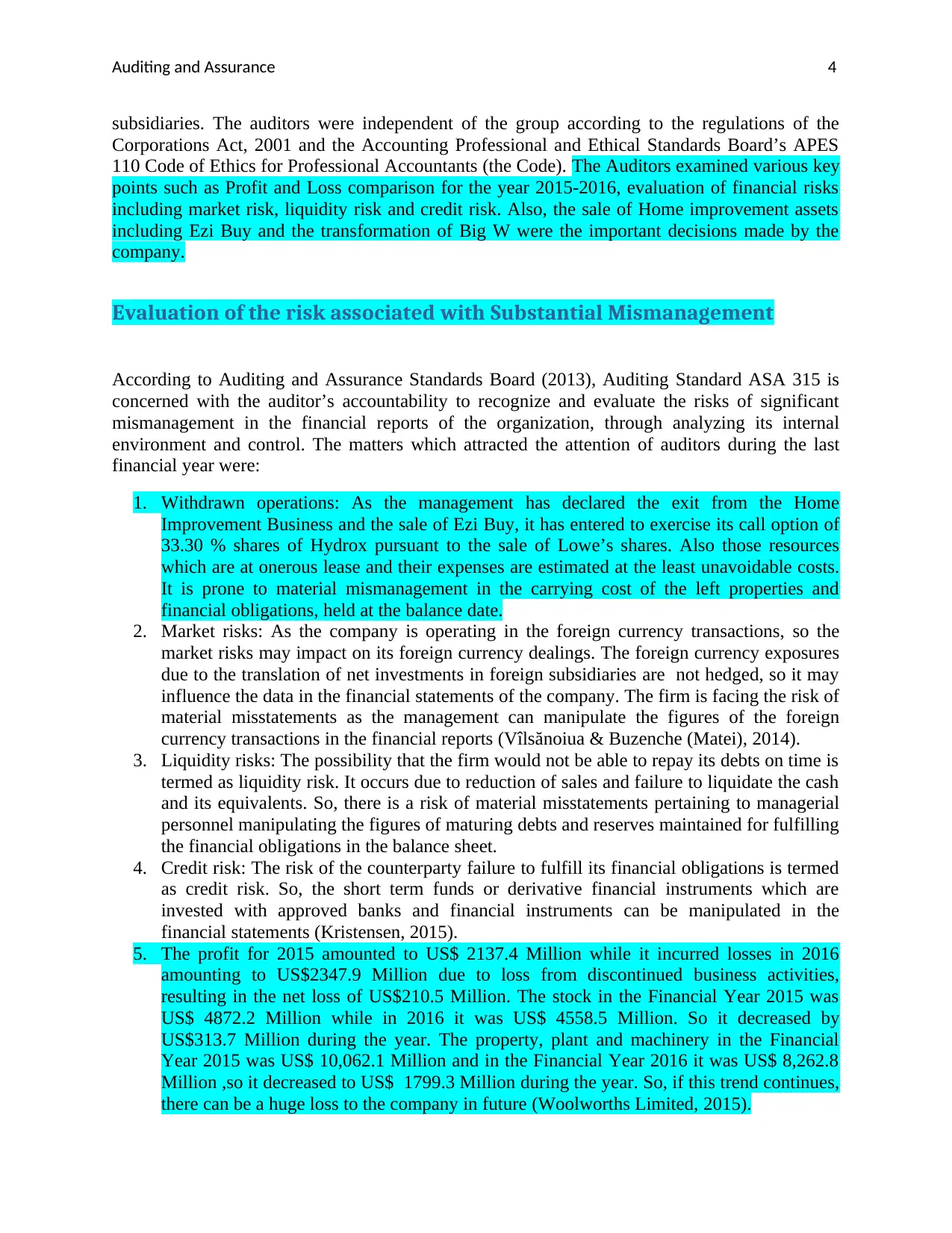
Auditing and Assurance 4
subsidiaries. The auditors were independent of the group according to the regulations of the
Corporations Act, 2001 and the Accounting Professional and Ethical Standards Board’s APES
110 Code of Ethics for Professional Accountants (the Code). The Auditors examined various key
points such as Profit and Loss comparison for the year 2015-2016, evaluation of financial risks
including market risk, liquidity risk and credit risk. Also, the sale of Home improvement assets
including Ezi Buy and the transformation of Big W were the important decisions made by the
company.
Evaluation of the risk associated with Substantial Mismanagement
According to Auditing and Assurance Standards Board (2013), Auditing Standard ASA 315 is
concerned with the auditor’s accountability to recognize and evaluate the risks of significant
mismanagement in the financial reports of the organization, through analyzing its internal
environment and control. The matters which attracted the attention of auditors during the last
financial year were:
1. Withdrawn operations: As the management has declared the exit from the Home
Improvement Business and the sale of Ezi Buy, it has entered to exercise its call option of
33.30 % shares of Hydrox pursuant to the sale of Lowe’s shares. Also those resources
which are at onerous lease and their expenses are estimated at the least unavoidable costs.
It is prone to material mismanagement in the carrying cost of the left properties and
financial obligations, held at the balance date.
2. Market risks: As the company is operating in the foreign currency transactions, so the
market risks may impact on its foreign currency dealings. The foreign currency exposures
due to the translation of net investments in foreign subsidiaries are not hedged, so it may
influence the data in the financial statements of the company. The firm is facing the risk of
material misstatements as the management can manipulate the figures of the foreign
currency transactions in the financial reports (Vîlsănoiua & Buzenche (Matei), 2014).
3. Liquidity risks: The possibility that the firm would not be able to repay its debts on time is
termed as liquidity risk. It occurs due to reduction of sales and failure to liquidate the cash
and its equivalents. So, there is a risk of material misstatements pertaining to managerial
personnel manipulating the figures of maturing debts and reserves maintained for fulfilling
the financial obligations in the balance sheet.
4. Credit risk: The risk of the counterparty failure to fulfill its financial obligations is termed
as credit risk. So, the short term funds or derivative financial instruments which are
invested with approved banks and financial instruments can be manipulated in the
financial statements (Kristensen, 2015).
5. The profit for 2015 amounted to US$ 2137.4 Million while it incurred losses in 2016
amounting to US$2347.9 Million due to loss from discontinued business activities,
resulting in the net loss of US$210.5 Million. The stock in the Financial Year 2015 was
US$ 4872.2 Million while in 2016 it was US$ 4558.5 Million. So it decreased by
US$313.7 Million during the year. The property, plant and machinery in the Financial
Year 2015 was US$ 10,062.1 Million and in the Financial Year 2016 it was US$ 8,262.8
Million ,so it decreased to US$ 1799.3 Million during the year. So, if this trend continues,
there can be a huge loss to the company in future (Woolworths Limited, 2015).
subsidiaries. The auditors were independent of the group according to the regulations of the
Corporations Act, 2001 and the Accounting Professional and Ethical Standards Board’s APES
110 Code of Ethics for Professional Accountants (the Code). The Auditors examined various key
points such as Profit and Loss comparison for the year 2015-2016, evaluation of financial risks
including market risk, liquidity risk and credit risk. Also, the sale of Home improvement assets
including Ezi Buy and the transformation of Big W were the important decisions made by the
company.
Evaluation of the risk associated with Substantial Mismanagement
According to Auditing and Assurance Standards Board (2013), Auditing Standard ASA 315 is
concerned with the auditor’s accountability to recognize and evaluate the risks of significant
mismanagement in the financial reports of the organization, through analyzing its internal
environment and control. The matters which attracted the attention of auditors during the last
financial year were:
1. Withdrawn operations: As the management has declared the exit from the Home
Improvement Business and the sale of Ezi Buy, it has entered to exercise its call option of
33.30 % shares of Hydrox pursuant to the sale of Lowe’s shares. Also those resources
which are at onerous lease and their expenses are estimated at the least unavoidable costs.
It is prone to material mismanagement in the carrying cost of the left properties and
financial obligations, held at the balance date.
2. Market risks: As the company is operating in the foreign currency transactions, so the
market risks may impact on its foreign currency dealings. The foreign currency exposures
due to the translation of net investments in foreign subsidiaries are not hedged, so it may
influence the data in the financial statements of the company. The firm is facing the risk of
material misstatements as the management can manipulate the figures of the foreign
currency transactions in the financial reports (Vîlsănoiua & Buzenche (Matei), 2014).
3. Liquidity risks: The possibility that the firm would not be able to repay its debts on time is
termed as liquidity risk. It occurs due to reduction of sales and failure to liquidate the cash
and its equivalents. So, there is a risk of material misstatements pertaining to managerial
personnel manipulating the figures of maturing debts and reserves maintained for fulfilling
the financial obligations in the balance sheet.
4. Credit risk: The risk of the counterparty failure to fulfill its financial obligations is termed
as credit risk. So, the short term funds or derivative financial instruments which are
invested with approved banks and financial instruments can be manipulated in the
financial statements (Kristensen, 2015).
5. The profit for 2015 amounted to US$ 2137.4 Million while it incurred losses in 2016
amounting to US$2347.9 Million due to loss from discontinued business activities,
resulting in the net loss of US$210.5 Million. The stock in the Financial Year 2015 was
US$ 4872.2 Million while in 2016 it was US$ 4558.5 Million. So it decreased by
US$313.7 Million during the year. The property, plant and machinery in the Financial
Year 2015 was US$ 10,062.1 Million and in the Financial Year 2016 it was US$ 8,262.8
Million ,so it decreased to US$ 1799.3 Million during the year. So, if this trend continues,
there can be a huge loss to the company in future (Woolworths Limited, 2015).
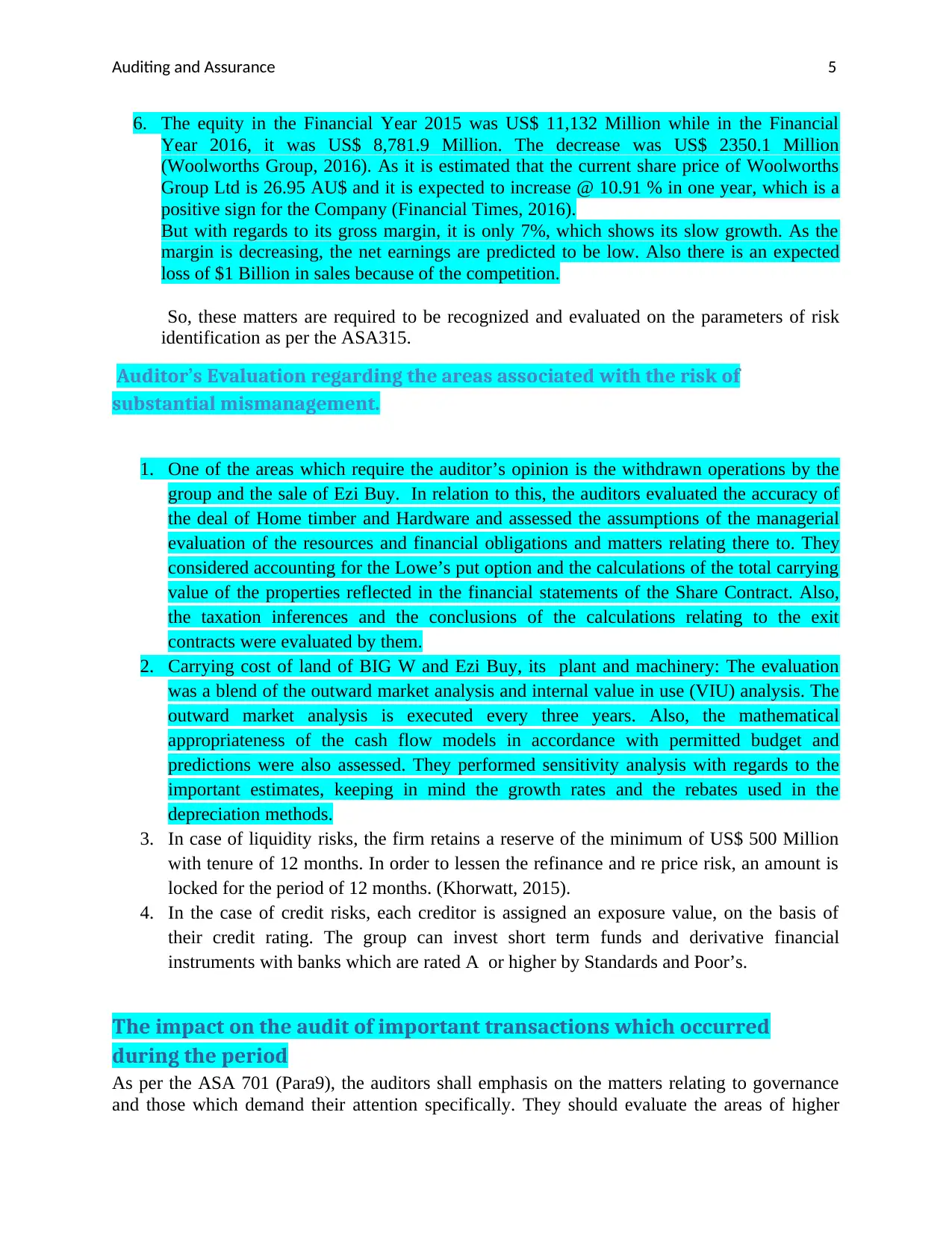
Auditing and Assurance 5
6. The equity in the Financial Year 2015 was US$ 11,132 Million while in the Financial
Year 2016, it was US$ 8,781.9 Million. The decrease was US$ 2350.1 Million
(Woolworths Group, 2016). As it is estimated that the current share price of Woolworths
Group Ltd is 26.95 AU$ and it is expected to increase @ 10.91 % in one year, which is a
positive sign for the Company (Financial Times, 2016).
But with regards to its gross margin, it is only 7%, which shows its slow growth. As the
margin is decreasing, the net earnings are predicted to be low. Also there is an expected
loss of $1 Billion in sales because of the competition.
So, these matters are required to be recognized and evaluated on the parameters of risk
identification as per the ASA315.
Auditor’s Evaluation regarding the areas associated with the risk of
substantial mismanagement.
1. One of the areas which require the auditor’s opinion is the withdrawn operations by the
group and the sale of Ezi Buy. In relation to this, the auditors evaluated the accuracy of
the deal of Home timber and Hardware and assessed the assumptions of the managerial
evaluation of the resources and financial obligations and matters relating there to. They
considered accounting for the Lowe’s put option and the calculations of the total carrying
value of the properties reflected in the financial statements of the Share Contract. Also,
the taxation inferences and the conclusions of the calculations relating to the exit
contracts were evaluated by them.
2. Carrying cost of land of BIG W and Ezi Buy, its plant and machinery: The evaluation
was a blend of the outward market analysis and internal value in use (VIU) analysis. The
outward market analysis is executed every three years. Also, the mathematical
appropriateness of the cash flow models in accordance with permitted budget and
predictions were also assessed. They performed sensitivity analysis with regards to the
important estimates, keeping in mind the growth rates and the rebates used in the
depreciation methods.
3. In case of liquidity risks, the firm retains a reserve of the minimum of US$ 500 Million
with tenure of 12 months. In order to lessen the refinance and re price risk, an amount is
locked for the period of 12 months. (Khorwatt, 2015).
4. In the case of credit risks, each creditor is assigned an exposure value, on the basis of
their credit rating. The group can invest short term funds and derivative financial
instruments with banks which are rated A or higher by Standards and Poor’s.
The impact on the audit of important transactions which occurred
during the period
As per the ASA 701 (Para9), the auditors shall emphasis on the matters relating to governance
and those which demand their attention specifically. They should evaluate the areas of higher
6. The equity in the Financial Year 2015 was US$ 11,132 Million while in the Financial
Year 2016, it was US$ 8,781.9 Million. The decrease was US$ 2350.1 Million
(Woolworths Group, 2016). As it is estimated that the current share price of Woolworths
Group Ltd is 26.95 AU$ and it is expected to increase @ 10.91 % in one year, which is a
positive sign for the Company (Financial Times, 2016).
But with regards to its gross margin, it is only 7%, which shows its slow growth. As the
margin is decreasing, the net earnings are predicted to be low. Also there is an expected
loss of $1 Billion in sales because of the competition.
So, these matters are required to be recognized and evaluated on the parameters of risk
identification as per the ASA315.
Auditor’s Evaluation regarding the areas associated with the risk of
substantial mismanagement.
1. One of the areas which require the auditor’s opinion is the withdrawn operations by the
group and the sale of Ezi Buy. In relation to this, the auditors evaluated the accuracy of
the deal of Home timber and Hardware and assessed the assumptions of the managerial
evaluation of the resources and financial obligations and matters relating there to. They
considered accounting for the Lowe’s put option and the calculations of the total carrying
value of the properties reflected in the financial statements of the Share Contract. Also,
the taxation inferences and the conclusions of the calculations relating to the exit
contracts were evaluated by them.
2. Carrying cost of land of BIG W and Ezi Buy, its plant and machinery: The evaluation
was a blend of the outward market analysis and internal value in use (VIU) analysis. The
outward market analysis is executed every three years. Also, the mathematical
appropriateness of the cash flow models in accordance with permitted budget and
predictions were also assessed. They performed sensitivity analysis with regards to the
important estimates, keeping in mind the growth rates and the rebates used in the
depreciation methods.
3. In case of liquidity risks, the firm retains a reserve of the minimum of US$ 500 Million
with tenure of 12 months. In order to lessen the refinance and re price risk, an amount is
locked for the period of 12 months. (Khorwatt, 2015).
4. In the case of credit risks, each creditor is assigned an exposure value, on the basis of
their credit rating. The group can invest short term funds and derivative financial
instruments with banks which are rated A or higher by Standards and Poor’s.
The impact on the audit of important transactions which occurred
during the period
As per the ASA 701 (Para9), the auditors shall emphasis on the matters relating to governance
and those which demand their attention specifically. They should evaluate the areas of higher
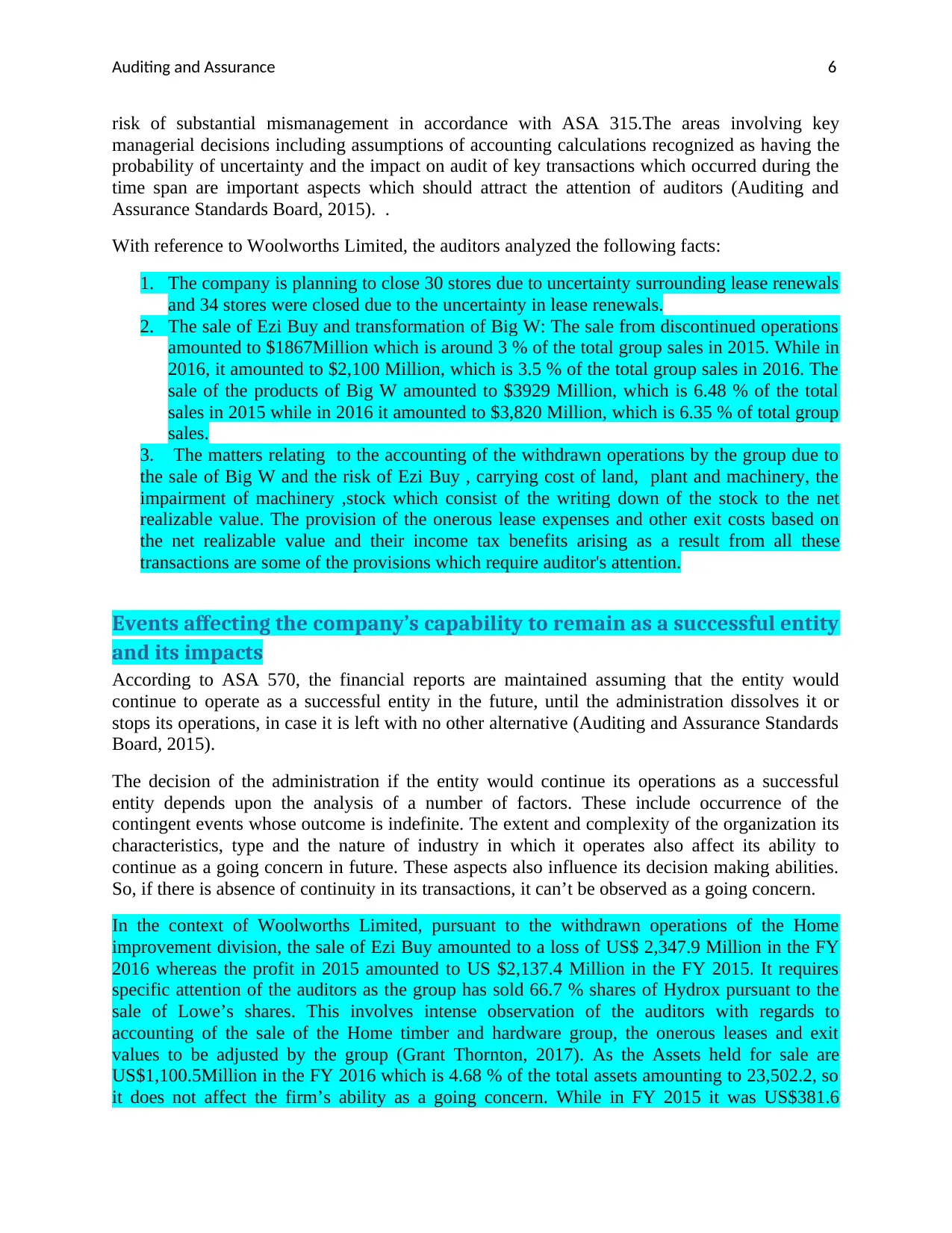
Auditing and Assurance 6
risk of substantial mismanagement in accordance with ASA 315.The areas involving key
managerial decisions including assumptions of accounting calculations recognized as having the
probability of uncertainty and the impact on audit of key transactions which occurred during the
time span are important aspects which should attract the attention of auditors (Auditing and
Assurance Standards Board, 2015). .
With reference to Woolworths Limited, the auditors analyzed the following facts:
1. The company is planning to close 30 stores due to uncertainty surrounding lease renewals
and 34 stores were closed due to the uncertainty in lease renewals.
2. The sale of Ezi Buy and transformation of Big W: The sale from discontinued operations
amounted to $1867Million which is around 3 % of the total group sales in 2015. While in
2016, it amounted to $2,100 Million, which is 3.5 % of the total group sales in 2016. The
sale of the products of Big W amounted to $3929 Million, which is 6.48 % of the total
sales in 2015 while in 2016 it amounted to $3,820 Million, which is 6.35 % of total group
sales.
3. The matters relating to the accounting of the withdrawn operations by the group due to
the sale of Big W and the risk of Ezi Buy , carrying cost of land, plant and machinery, the
impairment of machinery ,stock which consist of the writing down of the stock to the net
realizable value. The provision of the onerous lease expenses and other exit costs based on
the net realizable value and their income tax benefits arising as a result from all these
transactions are some of the provisions which require auditor's attention.
Events affecting the company’s capability to remain as a successful entity
and its impacts
According to ASA 570, the financial reports are maintained assuming that the entity would
continue to operate as a successful entity in the future, until the administration dissolves it or
stops its operations, in case it is left with no other alternative (Auditing and Assurance Standards
Board, 2015).
The decision of the administration if the entity would continue its operations as a successful
entity depends upon the analysis of a number of factors. These include occurrence of the
contingent events whose outcome is indefinite. The extent and complexity of the organization its
characteristics, type and the nature of industry in which it operates also affect its ability to
continue as a going concern in future. These aspects also influence its decision making abilities.
So, if there is absence of continuity in its transactions, it can’t be observed as a going concern.
In the context of Woolworths Limited, pursuant to the withdrawn operations of the Home
improvement division, the sale of Ezi Buy amounted to a loss of US$ 2,347.9 Million in the FY
2016 whereas the profit in 2015 amounted to US $2,137.4 Million in the FY 2015. It requires
specific attention of the auditors as the group has sold 66.7 % shares of Hydrox pursuant to the
sale of Lowe’s shares. This involves intense observation of the auditors with regards to
accounting of the sale of the Home timber and hardware group, the onerous leases and exit
values to be adjusted by the group (Grant Thornton, 2017). As the Assets held for sale are
US$1,100.5Million in the FY 2016 which is 4.68 % of the total assets amounting to 23,502.2, so
it does not affect the firm’s ability as a going concern. While in FY 2015 it was US$381.6
risk of substantial mismanagement in accordance with ASA 315.The areas involving key
managerial decisions including assumptions of accounting calculations recognized as having the
probability of uncertainty and the impact on audit of key transactions which occurred during the
time span are important aspects which should attract the attention of auditors (Auditing and
Assurance Standards Board, 2015). .
With reference to Woolworths Limited, the auditors analyzed the following facts:
1. The company is planning to close 30 stores due to uncertainty surrounding lease renewals
and 34 stores were closed due to the uncertainty in lease renewals.
2. The sale of Ezi Buy and transformation of Big W: The sale from discontinued operations
amounted to $1867Million which is around 3 % of the total group sales in 2015. While in
2016, it amounted to $2,100 Million, which is 3.5 % of the total group sales in 2016. The
sale of the products of Big W amounted to $3929 Million, which is 6.48 % of the total
sales in 2015 while in 2016 it amounted to $3,820 Million, which is 6.35 % of total group
sales.
3. The matters relating to the accounting of the withdrawn operations by the group due to
the sale of Big W and the risk of Ezi Buy , carrying cost of land, plant and machinery, the
impairment of machinery ,stock which consist of the writing down of the stock to the net
realizable value. The provision of the onerous lease expenses and other exit costs based on
the net realizable value and their income tax benefits arising as a result from all these
transactions are some of the provisions which require auditor's attention.
Events affecting the company’s capability to remain as a successful entity
and its impacts
According to ASA 570, the financial reports are maintained assuming that the entity would
continue to operate as a successful entity in the future, until the administration dissolves it or
stops its operations, in case it is left with no other alternative (Auditing and Assurance Standards
Board, 2015).
The decision of the administration if the entity would continue its operations as a successful
entity depends upon the analysis of a number of factors. These include occurrence of the
contingent events whose outcome is indefinite. The extent and complexity of the organization its
characteristics, type and the nature of industry in which it operates also affect its ability to
continue as a going concern in future. These aspects also influence its decision making abilities.
So, if there is absence of continuity in its transactions, it can’t be observed as a going concern.
In the context of Woolworths Limited, pursuant to the withdrawn operations of the Home
improvement division, the sale of Ezi Buy amounted to a loss of US$ 2,347.9 Million in the FY
2016 whereas the profit in 2015 amounted to US $2,137.4 Million in the FY 2015. It requires
specific attention of the auditors as the group has sold 66.7 % shares of Hydrox pursuant to the
sale of Lowe’s shares. This involves intense observation of the auditors with regards to
accounting of the sale of the Home timber and hardware group, the onerous leases and exit
values to be adjusted by the group (Grant Thornton, 2017). As the Assets held for sale are
US$1,100.5Million in the FY 2016 which is 4.68 % of the total assets amounting to 23,502.2, so
it does not affect the firm’s ability as a going concern. While in FY 2015 it was US$381.6
Paraphrase This Document
Need a fresh take? Get an instant paraphrase of this document with our AI Paraphraser
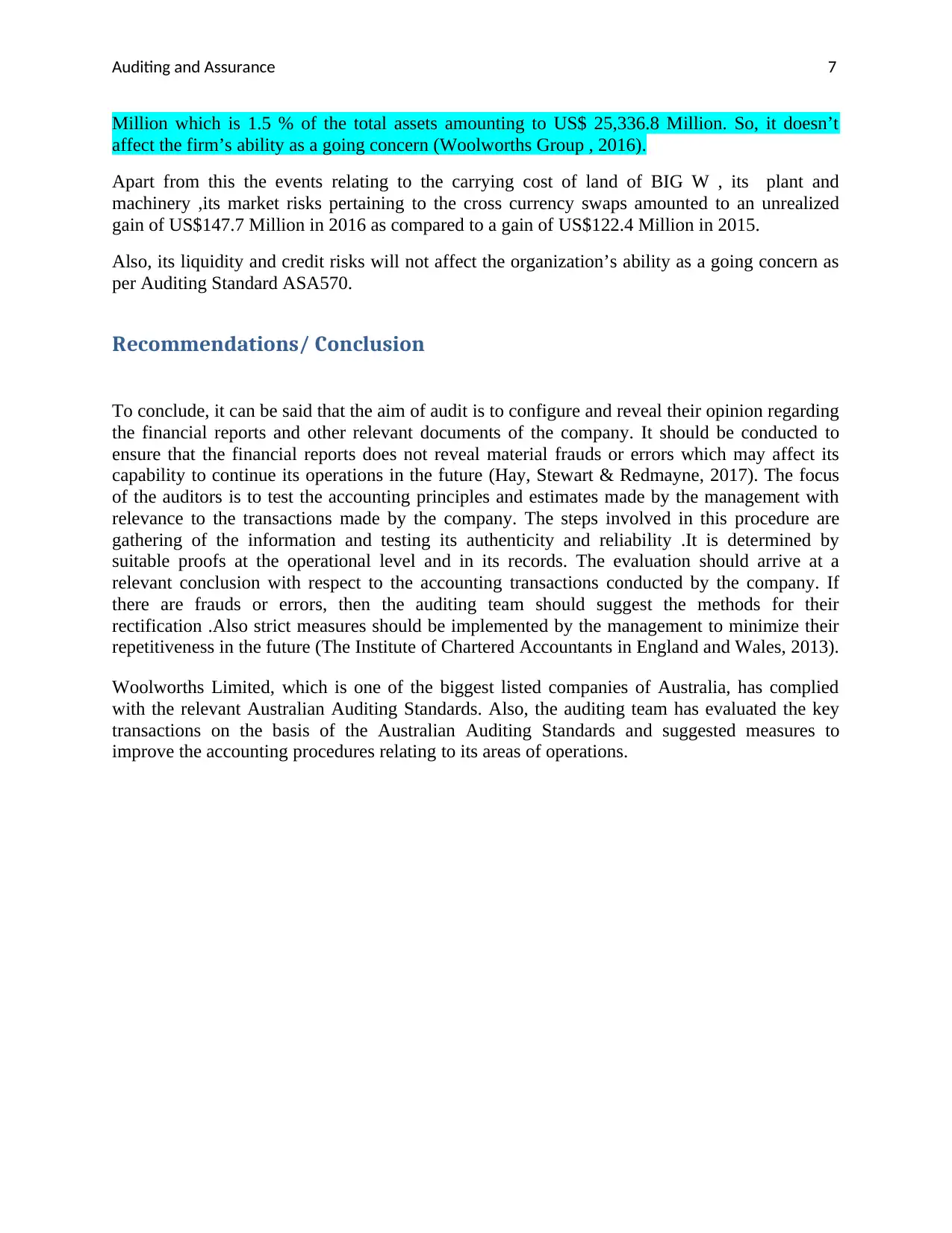
Auditing and Assurance 7
Million which is 1.5 % of the total assets amounting to US$ 25,336.8 Million. So, it doesn’t
affect the firm’s ability as a going concern (Woolworths Group , 2016).
Apart from this the events relating to the carrying cost of land of BIG W , its plant and
machinery ,its market risks pertaining to the cross currency swaps amounted to an unrealized
gain of US$147.7 Million in 2016 as compared to a gain of US$122.4 Million in 2015.
Also, its liquidity and credit risks will not affect the organization’s ability as a going concern as
per Auditing Standard ASA570.
Recommendations/ Conclusion
To conclude, it can be said that the aim of audit is to configure and reveal their opinion regarding
the financial reports and other relevant documents of the company. It should be conducted to
ensure that the financial reports does not reveal material frauds or errors which may affect its
capability to continue its operations in the future (Hay, Stewart & Redmayne, 2017). The focus
of the auditors is to test the accounting principles and estimates made by the management with
relevance to the transactions made by the company. The steps involved in this procedure are
gathering of the information and testing its authenticity and reliability .It is determined by
suitable proofs at the operational level and in its records. The evaluation should arrive at a
relevant conclusion with respect to the accounting transactions conducted by the company. If
there are frauds or errors, then the auditing team should suggest the methods for their
rectification .Also strict measures should be implemented by the management to minimize their
repetitiveness in the future (The Institute of Chartered Accountants in England and Wales, 2013).
Woolworths Limited, which is one of the biggest listed companies of Australia, has complied
with the relevant Australian Auditing Standards. Also, the auditing team has evaluated the key
transactions on the basis of the Australian Auditing Standards and suggested measures to
improve the accounting procedures relating to its areas of operations.
Million which is 1.5 % of the total assets amounting to US$ 25,336.8 Million. So, it doesn’t
affect the firm’s ability as a going concern (Woolworths Group , 2016).
Apart from this the events relating to the carrying cost of land of BIG W , its plant and
machinery ,its market risks pertaining to the cross currency swaps amounted to an unrealized
gain of US$147.7 Million in 2016 as compared to a gain of US$122.4 Million in 2015.
Also, its liquidity and credit risks will not affect the organization’s ability as a going concern as
per Auditing Standard ASA570.
Recommendations/ Conclusion
To conclude, it can be said that the aim of audit is to configure and reveal their opinion regarding
the financial reports and other relevant documents of the company. It should be conducted to
ensure that the financial reports does not reveal material frauds or errors which may affect its
capability to continue its operations in the future (Hay, Stewart & Redmayne, 2017). The focus
of the auditors is to test the accounting principles and estimates made by the management with
relevance to the transactions made by the company. The steps involved in this procedure are
gathering of the information and testing its authenticity and reliability .It is determined by
suitable proofs at the operational level and in its records. The evaluation should arrive at a
relevant conclusion with respect to the accounting transactions conducted by the company. If
there are frauds or errors, then the auditing team should suggest the methods for their
rectification .Also strict measures should be implemented by the management to minimize their
repetitiveness in the future (The Institute of Chartered Accountants in England and Wales, 2013).
Woolworths Limited, which is one of the biggest listed companies of Australia, has complied
with the relevant Australian Auditing Standards. Also, the auditing team has evaluated the key
transactions on the basis of the Australian Auditing Standards and suggested measures to
improve the accounting procedures relating to its areas of operations.
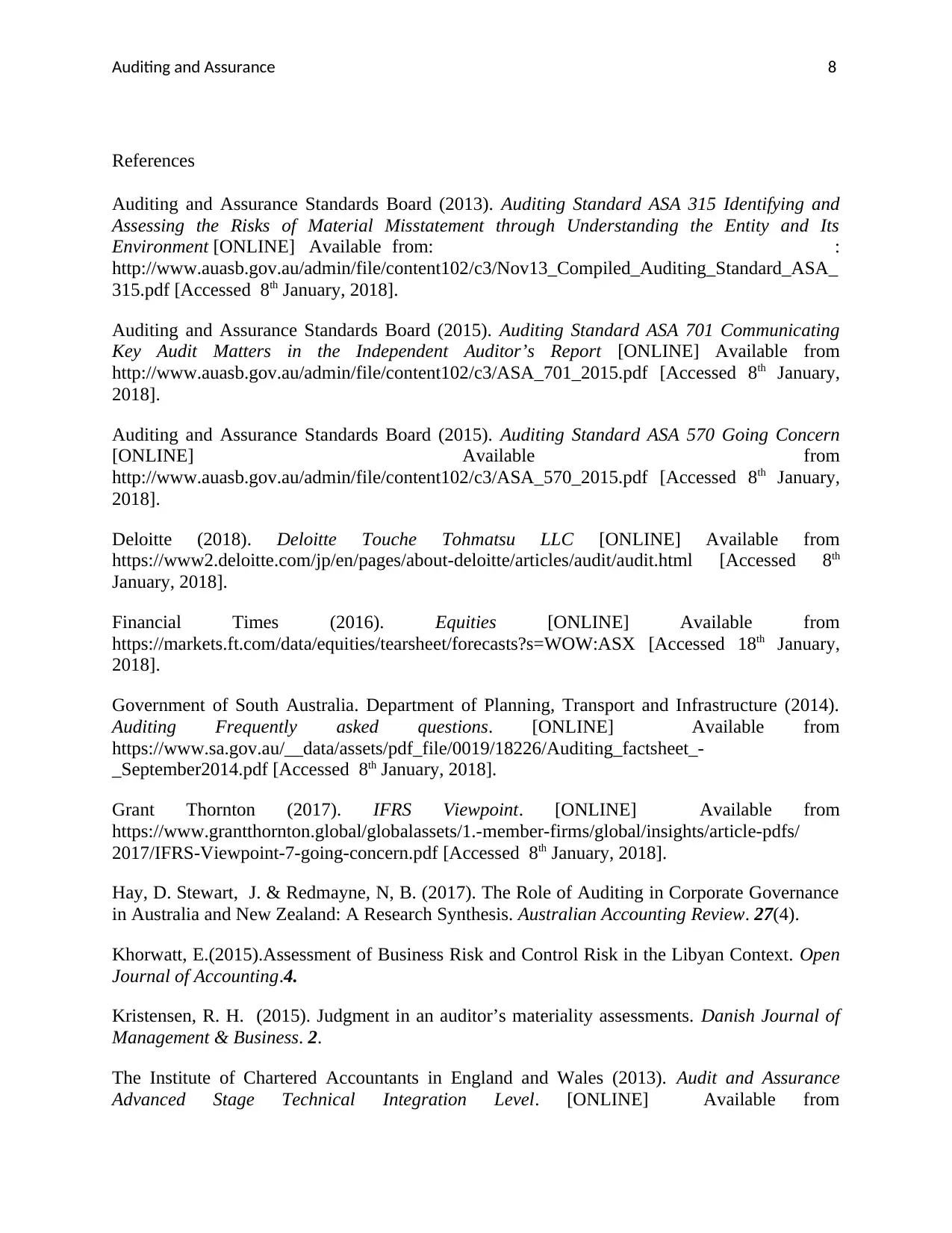
Auditing and Assurance 8
References
Auditing and Assurance Standards Board (2013). Auditing Standard ASA 315 Identifying and
Assessing the Risks of Material Misstatement through Understanding the Entity and Its
Environment [ONLINE] Available from: :
http://www.auasb.gov.au/admin/file/content102/c3/Nov13_Compiled_Auditing_Standard_ASA_
315.pdf [Accessed 8th January, 2018].
Auditing and Assurance Standards Board (2015). Auditing Standard ASA 701 Communicating
Key Audit Matters in the Independent Auditor’s Report [ONLINE] Available from
http://www.auasb.gov.au/admin/file/content102/c3/ASA_701_2015.pdf [Accessed 8th January,
2018].
Auditing and Assurance Standards Board (2015). Auditing Standard ASA 570 Going Concern
[ONLINE] Available from
http://www.auasb.gov.au/admin/file/content102/c3/ASA_570_2015.pdf [Accessed 8th January,
2018].
Deloitte (2018). Deloitte Touche Tohmatsu LLC [ONLINE] Available from
https://www2.deloitte.com/jp/en/pages/about-deloitte/articles/audit/audit.html [Accessed 8th
January, 2018].
Financial Times (2016). Equities [ONLINE] Available from
https://markets.ft.com/data/equities/tearsheet/forecasts?s=WOW:ASX [Accessed 18th January,
2018].
Government of South Australia. Department of Planning, Transport and Infrastructure (2014).
Auditing Frequently asked questions. [ONLINE] Available from
https://www.sa.gov.au/__data/assets/pdf_file/0019/18226/Auditing_factsheet_-
_September2014.pdf [Accessed 8th January, 2018].
Grant Thornton (2017). IFRS Viewpoint. [ONLINE] Available from
https://www.grantthornton.global/globalassets/1.-member-firms/global/insights/article-pdfs/
2017/IFRS-Viewpoint-7-going-concern.pdf [Accessed 8th January, 2018].
Hay, D. Stewart, J. & Redmayne, N, B. (2017). The Role of Auditing in Corporate Governance
in Australia and New Zealand: A Research Synthesis. Australian Accounting Review. 27(4).
Khorwatt, E.(2015).Assessment of Business Risk and Control Risk in the Libyan Context. Open
Journal of Accounting.4.
Kristensen, R. H. (2015). Judgment in an auditor’s materiality assessments. Danish Journal of
Management & Business. 2.
The Institute of Chartered Accountants in England and Wales (2013). Audit and Assurance
Advanced Stage Technical Integration Level. [ONLINE] Available from
References
Auditing and Assurance Standards Board (2013). Auditing Standard ASA 315 Identifying and
Assessing the Risks of Material Misstatement through Understanding the Entity and Its
Environment [ONLINE] Available from: :
http://www.auasb.gov.au/admin/file/content102/c3/Nov13_Compiled_Auditing_Standard_ASA_
315.pdf [Accessed 8th January, 2018].
Auditing and Assurance Standards Board (2015). Auditing Standard ASA 701 Communicating
Key Audit Matters in the Independent Auditor’s Report [ONLINE] Available from
http://www.auasb.gov.au/admin/file/content102/c3/ASA_701_2015.pdf [Accessed 8th January,
2018].
Auditing and Assurance Standards Board (2015). Auditing Standard ASA 570 Going Concern
[ONLINE] Available from
http://www.auasb.gov.au/admin/file/content102/c3/ASA_570_2015.pdf [Accessed 8th January,
2018].
Deloitte (2018). Deloitte Touche Tohmatsu LLC [ONLINE] Available from
https://www2.deloitte.com/jp/en/pages/about-deloitte/articles/audit/audit.html [Accessed 8th
January, 2018].
Financial Times (2016). Equities [ONLINE] Available from
https://markets.ft.com/data/equities/tearsheet/forecasts?s=WOW:ASX [Accessed 18th January,
2018].
Government of South Australia. Department of Planning, Transport and Infrastructure (2014).
Auditing Frequently asked questions. [ONLINE] Available from
https://www.sa.gov.au/__data/assets/pdf_file/0019/18226/Auditing_factsheet_-
_September2014.pdf [Accessed 8th January, 2018].
Grant Thornton (2017). IFRS Viewpoint. [ONLINE] Available from
https://www.grantthornton.global/globalassets/1.-member-firms/global/insights/article-pdfs/
2017/IFRS-Viewpoint-7-going-concern.pdf [Accessed 8th January, 2018].
Hay, D. Stewart, J. & Redmayne, N, B. (2017). The Role of Auditing in Corporate Governance
in Australia and New Zealand: A Research Synthesis. Australian Accounting Review. 27(4).
Khorwatt, E.(2015).Assessment of Business Risk and Control Risk in the Libyan Context. Open
Journal of Accounting.4.
Kristensen, R. H. (2015). Judgment in an auditor’s materiality assessments. Danish Journal of
Management & Business. 2.
The Institute of Chartered Accountants in England and Wales (2013). Audit and Assurance
Advanced Stage Technical Integration Level. [ONLINE] Available from
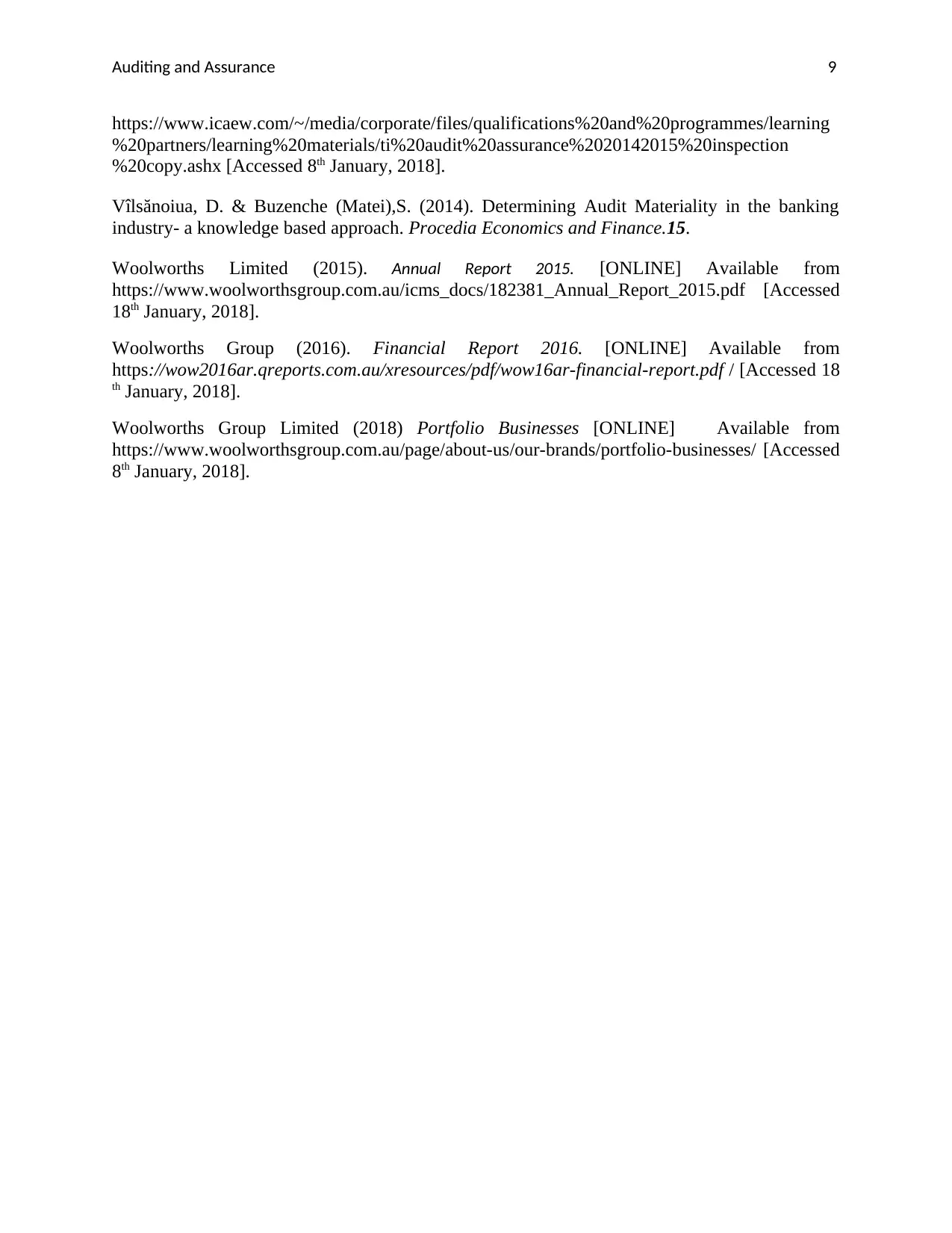
Auditing and Assurance 9
https://www.icaew.com/~/media/corporate/files/qualifications%20and%20programmes/learning
%20partners/learning%20materials/ti%20audit%20assurance%2020142015%20inspection
%20copy.ashx [Accessed 8th January, 2018].
Vîlsănoiua, D. & Buzenche (Matei),S. (2014). Determining Audit Materiality in the banking
industry- a knowledge based approach. Procedia Economics and Finance.15.
Woolworths Limited (2015). Annual Report 2015. [ONLINE] Available from
https://www.woolworthsgroup.com.au/icms_docs/182381_Annual_Report_2015.pdf [Accessed
18th January, 2018].
Woolworths Group (2016). Financial Report 2016. [ONLINE] Available from
https://wow2016ar.qreports.com.au/xresources/pdf/wow16ar-financial-report.pdf / [Accessed 18
th January, 2018].
Woolworths Group Limited (2018) Portfolio Businesses [ONLINE] Available from
https://www.woolworthsgroup.com.au/page/about-us/our-brands/portfolio-businesses/ [Accessed
8th January, 2018].
https://www.icaew.com/~/media/corporate/files/qualifications%20and%20programmes/learning
%20partners/learning%20materials/ti%20audit%20assurance%2020142015%20inspection
%20copy.ashx [Accessed 8th January, 2018].
Vîlsănoiua, D. & Buzenche (Matei),S. (2014). Determining Audit Materiality in the banking
industry- a knowledge based approach. Procedia Economics and Finance.15.
Woolworths Limited (2015). Annual Report 2015. [ONLINE] Available from
https://www.woolworthsgroup.com.au/icms_docs/182381_Annual_Report_2015.pdf [Accessed
18th January, 2018].
Woolworths Group (2016). Financial Report 2016. [ONLINE] Available from
https://wow2016ar.qreports.com.au/xresources/pdf/wow16ar-financial-report.pdf / [Accessed 18
th January, 2018].
Woolworths Group Limited (2018) Portfolio Businesses [ONLINE] Available from
https://www.woolworthsgroup.com.au/page/about-us/our-brands/portfolio-businesses/ [Accessed
8th January, 2018].
1 out of 10
Related Documents
Your All-in-One AI-Powered Toolkit for Academic Success.
+13062052269
info@desklib.com
Available 24*7 on WhatsApp / Email
![[object Object]](/_next/static/media/star-bottom.7253800d.svg)
Unlock your academic potential
© 2024 | Zucol Services PVT LTD | All rights reserved.





